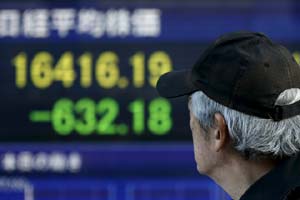Asian shares were taking a breather on Wednesday, looking to consolidate two sessions of solid gains as risk appetites finally showed some resilience to the latest selloff in oil prices.
A welcome break from weeks of turbulence saw the safe havens such as the yen and sovereign bonds ease just a little, though investors face a test later in the day when the Federal Reserve releases minutes of its last policy meeting.
MSCI’s broadest index of Asia-Pacific shares outside Japan was off just a shade in early trade, having climbed 3 percent over the previous two sessions.
Japan’s Nikkei put on 0.2 percent, bringing its gains for the week so far to almost 8 percent.
E-Mini futures for the S&P 500 firmed 0.1 percent after Wall Street managed to break the recent negative feedback loop with oil.
The Dow ended Tuesday with gains of 1.39 percent, while the S&P 500 added 1.65 percent and the Nasdaq 2.27 percent.
All 10 S&P sectors closed higher following an extended holiday weekend, with financials, healthcare and materials recouping some lost ground.
A survey of global fund managers found they had become so cautious they were holding more cash than at any time since late 2001, an “unambiguous buy” signal according to Bank of America Merrill Lynch.
Markets now await minutes of the Federal Reserve’s last meeting to judge the balance of opinion among policy makers on the prospect of further rate hikes.
Fed Chair Janet Yellen last week left open the chance of a move in March but also noted concerns about China and the impact of turmoil in global financial markets.
Investors have already priced out March <0#FF:> and see scant chance of a hike at all this year, which makes that consensus vulnerable to any hint of hawkishness in the minutes.
Caution helped the dollar hold firm on a basket of currencies at 96.956, after rising 1 percent on Tuesday. It was steady on the yen at 114.25, after finding support around 113.60.
The big loser was sterling, which has struggled so far in 2016 because of worries the UK might leave the euro zone.
Traders said UK markets face a pivotal week ahead of a two-day summit starting on Thursday at which Prime Minister David Cameron will try to persuade other leaders to support a deal to keep Britain in the European Union.
Sterling was stuck at $1.4295, having shed 1 percent against the dollar on Tuesday.
In commodity markets, top oil exporters Russia and Saudi Arabia agreed to freeze output levels but said the deal was contingent on other producers joining in.
Brent lost $1.21 to $32.18 on news of the deal.
“The market’s response to the agreement suggested they are underwhelmed,” said Felicity Emmett, co-head of Australian economics at ANZ.
“No cuts in production were agreed upon, however, given oil producers are battling for long-term market share. This weakens the impact of the agreement significantly, as does the lack of involvement by Iraq and Iran.”
Early Wednesday, U.S. crude was up 21 cents at $29.25 a barrel.
